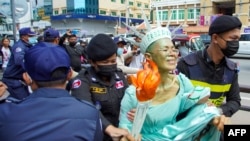Imprisoned Cambodian American human rights activist Theary Seng is well into a weeklong hunger strike she started on Monday to coincide with the ASEAN Summit in Phnom Penh, which President Joe Biden is expected to attend later this week.
Authorities jailed Theary Seng on June 14 following a mass trial in Phnom Penh of opposition activists and other dissidents. Since then, she has been held in a prison in rural Preah Vihear province, where her lawyers say she has been prevented from attending church services and making regular phone calls.
In a statement Monday, her lawyers called for her to be transferred to the main prison in Phnom Penh, and asked Biden to use his planned visit to Cambodia on November 12-13 to push for her release.
“Theary was convicted under provisions of the Cambodian Criminal Code that are routinely weaponized against human rights and democracy activists,” Margaux Ewen, director of the Freedom House Political Prisoners Initiative, said in a statement about her hunger strike.
Chin Malin, a secretary of state at Cambodia’s Ministry of Justice, said Tuesday that it was Theary Seng’s right to stage a hunger strike, but it wouldn’t bring her freedom.
“No one can force them to eat or not eat,” he said. “It can’t help. It’s just a politically motivated message to attract attention.”
A group of youth activists also announced a hunger strike this week in solidarity with Theary Seng, 51, and other imprisoned activists. Rights groups say some 50 political prisoners are currently being detained in Cambodia.
Six members of the rights group Khmer Thavrak started a hunger strike Monday and will appear at a temple in Preah Vihear, in front of the provincial prison, and in Freedom Park in central Phnom Penh.
Hun Vannak said his group wants the unconditional release of Theary Seng and the other jailed activists.
“[Theary Seng] was arrested unfairly and her freedom is completely restricted including sending her to be imprisoned in Preah Vihear province … and no one is allowed to visit,” Hun Vannak told VOA Khmer. “We are suffering when we see this. We have no choice other than doing a hunger strike.”
Theary Seng lived through the brutal Khmer Rouge era as a child, during which she lost both her parents. She left for America where she qualified as a lawyer, then returned to Cambodia in 1995.
In June, she was sentenced to six years in prison following a trial that has been criticized by international legal monitors as lacking evidence and violating due process. The longtime human rights lawyer and activist staged elaborate protests outside the court during the trial. She dressed as the Statue of Liberty for the final hearing after which she was arrested and taken into custody by police.
The U.S. State Department previously had called for the release of Theary Seng and others “unjustly detained” in Cambodia.
However, at a press briefing in Washington on Monday, State Department spokesman Ned Price would not say whether she was unjustly detained.
Price also said he was not aware of any official change to her status under the Levinson Act, which commits additional government resources to securing the release of individuals deemed “wrongfully detained.”
“We are providing Theary Seng and her family every form of appropriate assistance that we can,” Price said, adding that Secretary of State Antony Blinken and other senior U.S. officials would continue to raise her case with their Cambodian counterparts.
In June, U.S. ambassador to Cambodia, W. Patrick Murphy, tweeted that he was “deeply troubled” by Theary Seng’s verdict and called on Cambodian authorities “to release her and other human rights activists from unjust imprisonment.”
It’s unclear whether Biden will meet with Prime Minister Hun Sen during his two days in Phnom Penh, when he will attend the US-ASEAN meeting as part of the broader ASEAN Summit.
Theary Seng’s imprisonment helped prod the U.S. Senate Foreign Relations Committee into advancing the Cambodian Democracy Act, which threatens to sanction Cambodian leaders responsible for corruption and human rights abuses. The bill is awaiting a vote in the full Senate.
In August, senators traveled to Cambodia and asked for her release.
Cambodian-U.S. relations have deteriorated in sync with the deteriorating relations between the U.S. and China, propelling Phnom Penh into a cozy relationship with Beijing. On Wednesday, Chinese Premier Li Keqiang, in Cambodia for a six-day visit in conjunction with the ASEAN summit, signed 18 agreements with Hun Sen for cooperation in projects including road and bridge construction, health and education, and agricultural trade, according to the Associated Press.
A pain point for the U.S. has been China’s involvement in construction at the main naval base in Preah Sihanouk province. The Washington Post reported earlier this year that Western officials believe China is secretly building a naval facility for the exclusive use of its own military. Cambodian military officials have denied the claim to VOA Khmer.
Hun Sen’s government has also waged a sweeping crackdown on dissent in Cambodia, while the country’s courts have outlawed the main opposition party while the parliament has passed laws limiting freedoms of association.
This story originated in VOA's Khmer Service. Nike Ching contributed to this report. Some information came from The Associated Press.





